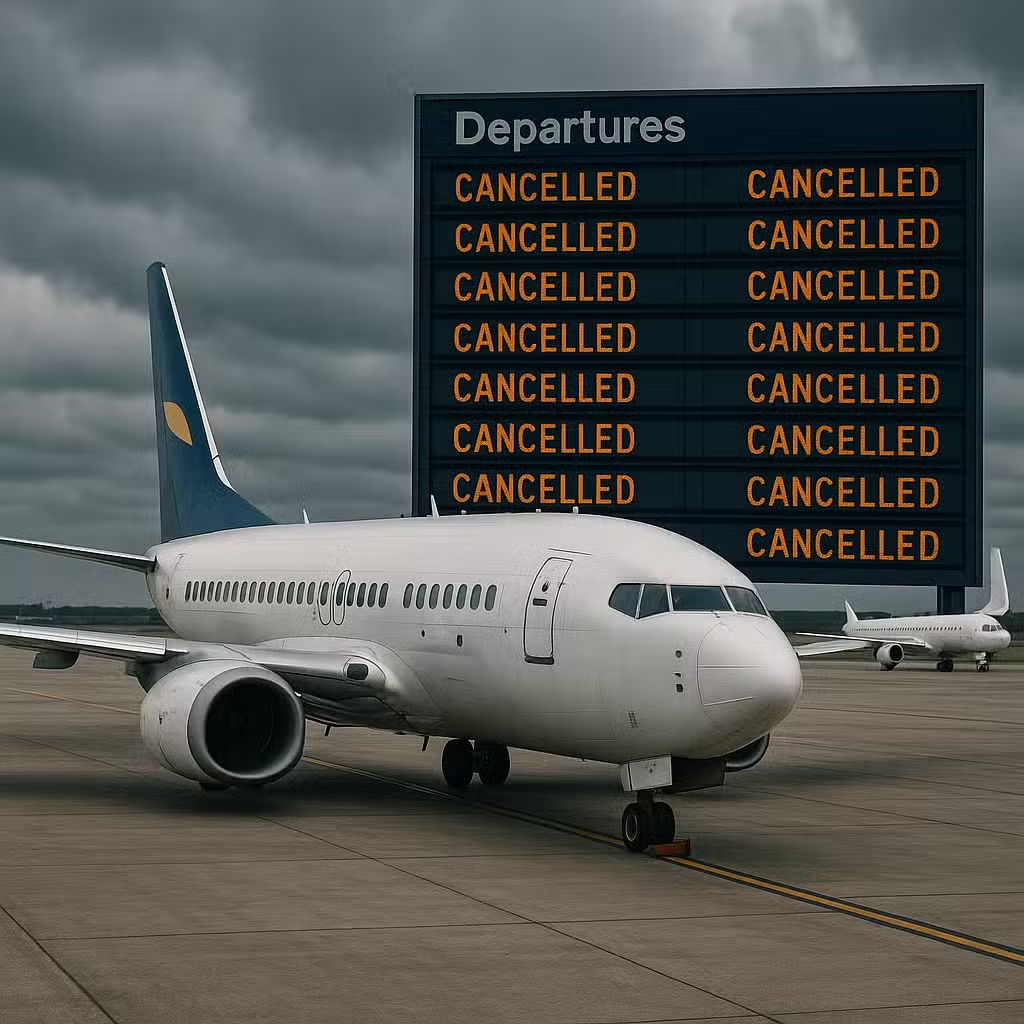FAA Shutdown Triggers U.S. Flight Cancellations, Raising Travel Disruption Risks for Investors
Imagine you’re planning a big family road trip, but suddenly, half the roads are closed and you have to find new ways to get where you want to go. That’s what’s happening right now in the airline industry, and it could affect not just travelers, but also investors.
Why This Matters for Investors
When airlines cancel flights, it’s not just an inconvenience for passengers. It can shake up airline stocks, affect travel-related companies, and even impact the whole market. If you have money in airline stocks, travel funds, or sectors that rely on travel (like hotels or car rentals), this is something to watch closely.
What’s Happening?
Because of a long government shutdown, the Federal Aviation Administration (FAA) told airlines to cancel hundreds of flights. Air traffic controllers, who help keep skies safe, haven’t been paid, and not enough are working. This is causing big delays and cancellations at major airports like Newark, San Francisco, and Atlanta.
- About 780 U.S. flights were canceled in one day, which is 3% of all flights, according to Cirium.
- The FAA says flight cuts will reach 10% at some airports by next week.
- Travelers are scrambling for other options, and car rental company Hertz saw a 20% jump in rentals compared to last year.
Airlines like American, United, and Delta are trying to avoid canceling big international flights, but many smaller city routes are being cut back.
Bull Case: Why Some Investors Might Stay Positive
- Higher ticket prices: Fewer flights can mean travelers compete for seats, which might raise prices and help airlines earn more per ticket.
- Short-term pain, long-term gain: If this happens during a slow travel season, airlines might recover quickly when demand returns.
- Flexibility: Major airlines are focusing cuts on routes with many flights, so the most important connections aren’t disappearing entirely.
Bear Case: Why Investors Should Be Cautious
- Lost demand: If the shutdown drags on, people might cancel trips, hurting airlines’ future bookings.
- Ripple effects: Travel troubles can spill over to hotels, restaurants, and even credit card companies that rely on travel spending.
- Unpredictable costs: Airlines may spend more on rebooking, refunds, and logistics to handle the chaos.
According to a Brookings Institution study, past government shutdowns cost the U.S. economy about $3 billion in lost output in 2019 alone. That shows how quickly these disruptions can add up.
Who and What Is Affected?
- Airlines: Especially those with lots of regional flights to smaller cities.
- Airports: Over 40 major airports are hit, including Atlanta, Chicago O’Hare, Dallas/Fort Worth, and more.
- Travelers: People are facing delays, cancellations, and the need to find new plans fast.
- Car rentals: Companies like Hertz are seeing a boost as people look for ways to finish their journeys.
- General aviation: Even private jet flights could face up to 10% cuts at some airports.
What Can Travelers Do?
- Check airline apps and websites often for updates.
- Arrive early to the airport and try not to check bags.
- Read the fine print on travel insurance—shutdowns aren’t always covered.
- Some credit cards offer trip insurance, but it’s not a sure thing.
Major Affected Airports
- Anchorage, Atlanta, Boston, Baltimore, Charlotte, Cincinnati, Dallas, Washington D.C., Denver, Detroit, Newark, Fort Lauderdale, Honolulu, Houston, Indianapolis, JFK (NY), Las Vegas, Los Angeles, LaGuardia (NY), Orlando, Chicago, Memphis, Miami, Minneapolis, Oakland, Ontario, Philadelphia, Phoenix, San Diego, Seattle, San Francisco, Salt Lake City, Teterboro, Tampa
For a full list, see the official FAA and DOT updates.
Investor Takeaway
- Review your portfolio: If you hold airline or travel stocks, check your exposure to companies most affected by flight cuts.
- Watch for bargains: Market drops from travel chaos can sometimes create buying opportunities in solid companies.
- Diversify: Don’t put all your eggs in one basket—spread investments across sectors.
- Stay updated: Follow news from the FAA and airlines for the latest on flight schedules and cancellations.
- Think long-term: Remember, short-term disruptions can pass, but it’s important to understand the risks and opportunities.
For the full original report, see CNBC







